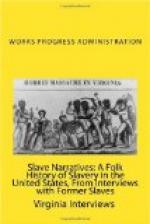“Goodbye—cum back agin.”
Miriam Logan, Lebanon, Ohio
Warren County, Dist. 2
July 2, 1937
Interview with SAMUEL SUTTON, Ex Slave.
Born in Garrett County, Kentucky, in 1854
(drawing of Sutton) [TR: no drawing found]
“Yes’em, I sho were bo’n into slavery. Mah mothah were a cook—(they was none betteah)—an she were sold four times to my knownin’. She were part white, for her fathah were a white man. She live to be seventy-nine yeahs an nine months old.”
“Ah was bo’n in Garrett County, but were raised by ol’ Marster Ballinger in Knox County, an’ ah don remember nothin ’bout Garrett County.” When Lincoln was elected last time, I were about eight yeahs ol’.”
“Ol’ Marster own ‘bout 400-acres, n’ ah don’ know how many slaves—maybe 30. He’d get hard up fo money n’ sell one or two; then he’d get a lotta work on hands, an maybe buy one or two cheap,—go ’long lak dat you see.” He were a good man, Ol’ Mars Ballinger were—a preacher, an he wuk hisse’f too. Ol’ Mis’ she pretty cross sometime, but ol’ Mars, he weren’t no mean man, an ah don’ ‘member he evah whip us. Yes’em dat ol’ hous is still standin’ on the Lexington-Lancaster Pike, and las time I know, Baby Marster he were still livin.”
“Ol’ Mars. tuk us boys out to learn to wuk when we was both right little me and Baby Mars. Ah wuz to he’p him, an do what he tol’ me to—an first thing ah members is a learnin to hoe de clods. Corn an wheat Ol’ Mars. raised, an he sets us boys out fo to learn to wuk. Soon as he lef’ us Baby Mars, he’d want to eat; send me ovah to de grocery fo sardines an’ oysters. Nevah see no body lak oyster lak he do! Ah do n’ lak dem. Ol Mars. scold him—say he not only lazy hese’f, but he make me lazy too.”
“De Wah? Yes’em ah sees soldiers, Union Calvary [HW: Cavalry] goin’ by, dressed fine, wid gold braid on blue, an big boots. But de Rebels now, I recollect dey had no uniforms fo dey wuz hard up, an dey cum in jes common clothes. Ol’ Mars., he were a Rebel, an he always he’p ’em. Yes’em a pitched battle start right on our place. Didn’t las’ long, fo dey wuz a runnin fight on to Perryville, whaah de one big battle to take place in de State o’ Kentucky, tuk place.”
“Most likely story I remembers to tell you ’bout were somepin made me mad an I allus remember fo’ dat. Ah had de bigges’ fines’ watermellon an ah wuz told to set up on de fence wid de watermellon an show ’em, and sell ’em fo twenty cents. Along cum a line o’ soldiers.”
“Heigh there boy!... How much for the mellon?” holler one at me.
“Twenty cents sir!” Ah say jes lak ah ben tol’ to say; and he take dat mellon right out o’ mah arms an’ ride off widout payin’ me. Ah run after dem, a tryin’ to get mah money, but ah couldn’t keep up wid dem soldiers on hosses; an all de soldiers jes’ laf at me.”
“Yes’em dat wuz de fines’ big mellon ah evah see. Dat wuz right mean in him—fine lookin gemman he were, at the head o’ de line.”




